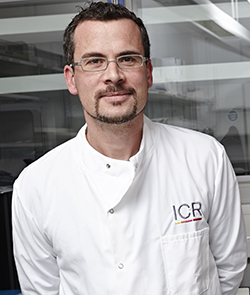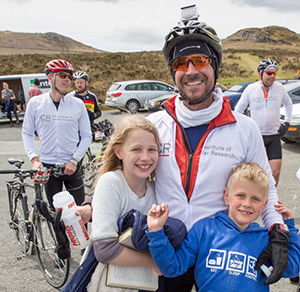Tim Morgan was diagnosed with advanced bowel cancer in 2015. He was committed to supporting our research into new treatments, so that others may survive their disease. Despite undergoing surgery and extensive targeted treatments, Tim died in 2019, aged 48.
Bowel cancer patients urgently need our support
We have made huge progress in cancer treatment over the years, but there continue to be cancers that have poor survival rates, such as advanced bowel cancer, the second most common cause of cancer death in the UK.
Bowel cancer affects over 42,000 people in the UK every year. And the frequency of bowel cancer in patients under the age of 50 is increasing.
Cancer can evolve and adapt to evade treatment. This can mean that drugs which are initially highly effective, often stop working after a few months. This ability to constantly adapt and develop drug resistance is the cause of the majority of deaths from cancer.
Finding ways to outsmart cancer evolution
We are investigating how cancer evolution leads to drug resistance, and how we can design smarter treatments to overcome this. Our research has shown that immunotherapy treatments can be highly effective even against tumours that can evolve very rapidly.
The immune system can also evolve, which allows it to learn and respond effectively when cancer cells develop resistance to treatments. This gives immunotherapies an advantage against evolving tumours, which conventional drugs don’t have.
Developing pioneering immunotherapy approaches

Dr Marco Gerlinger, who leads our Translational Oncogenomics Team, has discovered that bowel cancer patients who have stopped responding to existing therapies could benefit from immunotherapy.
His research has shown that we can direct the body’s own immune cells against these bowel cancers. He has also identified a mechanism that allows the cancer cells to inactivate the immune cells after they have invaded the cancer. Clinical trials are now using immunotherapies to target this mechanism and to unleash these immune cells.
Dr Gerlinger is developing biomarkers (a cell's biological features) to help us understand how a patient will respond to new types of treatments. This will help clinicians select bowel cancer patients most likely to benefit from immunotherapy treatment and prioritise those who may not respond to other kinds of therapies.
By understanding how these innovative treatments are able to mobilise the immune system against cancer, we can outsmart cancer and cut off the routes that tumours use to evade treatment.
Please donate today to help us develop smarter immunotherapy treatments for bowel cancer patients who urgently need them.
Donate now
“Advances in research gave us more time together as a family”

"My husband Tim died in November 2019, aged 48. His bowel cancer was already advanced by the time he was diagnosed. Several rounds of chemotherapy and radical surgery followed, but it didn’t work. The research that’s being done is so amazing. He had opportunities. He did really well on those treatments. But then it was a case of saying, there’s nothing more we can do for you. He found that really hard.” - Hilary Morgan
Tim was committed to supporting our research into new treatments, so that others may survive their disease. Dr Gerlinger's research really struck a chord with him. In 2016, along with his friends, he took on the gruelling ‘Dartmoor Demon’ cycle challenge raising over £270,000 to support his work. He was very proud to be a part of our research.
Dr Gerlinger: “I treat patients with gastro-intestinal cancers, and see first-hand how devastating it is for patients and their families when they receive the news that their treatment has stopped working and there are no other options. It is why I am determined to give these patients hope for the future.”
Please donate today to help us finish cancer.